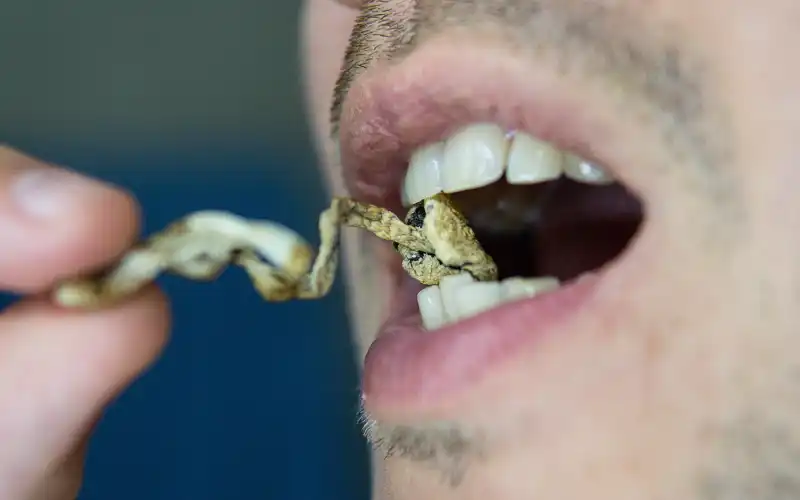Connect with us
Published
10 months agoon

A new study from researchers in Britain suggests that psilocybin may not only be effective in treating severe depression––it might also be the most cost-effective option, too.
The study, published by the Cambridge University Press, was predicated on a “decision model [that] simulated patient events (response, remission, and relapse) following treatment,” the authors said.
They explained that they derived data “on probabilities, costs and quality-adjusted life years (QALYs)…from previous studies or from best estimates.”
“Expected healthcare and societal costs and QALYs over a 6-month time period were calculated. Sensitivity analyses were used to address uncertainty in parameter estimates,” the authors wrote.
According to the researchers, the expected cost of psilocybin-assisted therapy “varied from £6132 to £7652 depending on the price of psilocybin.”
“This compares to £3528 for conventional medication alone, £4250 for [cognitive behavioural therapy] alone, and £4197 for their combination. [Quality-adjusted life years] were highest for psilocybin (0.310), followed by [cognitive behavioural therapy] alone (0.283), conventional medication alone (0.278), and their combination (0.287),” the researchers explained.
“Psilocybin was shown to be cost-effective compared to the other therapies when the cost of therapist support was reduced by 50% and the psilocybin price was reduced from its initial value to £400 to £800 per person. From a societal perspective, psilocybin had improved cost-effectiveness compared to a healthcare perspective.”
The authors concluded that psilocybin “has the potential to be a cost-effective therapy for severe depression,” but noted that it “depends on the level of psychological support that is given to patients receiving psilocybin and the price of the drug itself.”
“Further data on long-term outcomes are required to improve the evidence base,” they wrote.
The study is the latest in a growing body of research showcasing the potential of psilocybin and other psychedelics as a treatment for depression and other mental health disorders.
In a review of the study, the British medical publication News Medical called it “the clearest evidence yet that the future of treatment for certain significant mental-health related illnesses will be found in psychedelics-related treatment combined with therapy.”
“The results come at a time when figures uncovered by the BBC found more than a quarter of patients on antidepressants in England – about two million people – have been taking them for five years. Eight million people in England are on antidepressants – a one million rise from five years previously,” News Medical wrote. “The study has been authored by leading academics in the economics and psychedelics space, including Professor Paul McCrone of the University of Greenwich, sector-leading neuropsychopharmacologist David Nutt, and Henry Fisher and Clare Knight, who both work for the innovative commercial clinical research organization Clerkenwell Health.”
A study published in May found that psilocybin could serve as an effective treatment for obsessive-compulsive disorder.
The researchers for that study examined marble-burying behavior among a group of male mice, finding that the mice that were “administered psilocybin buried 32.84% fewer marbles over 30?min” than mice that were provided with different treatments.
Bernard Lerer, a psychiatry professor at Hebrew University and an author of the study, said that the results provided “preliminary evidence from studies in patients that psilocybin can help patients with OCD.”
However, he did express caution:
“But psilocybin induces a psychedelic trip and this requires special management. We think that psilocybin could help patients with OCD without the trip. How do we achieve this?” Lerer said. “We have shown in a different study that the medication, buspirone, which is used to treat anxiety, blocks a mouse equivalent of the psychedelic trip and another researcher has shown that it does so in humans. We wanted to find out whether psilocybin would be effective in a mouse model for anti-obsessional effects – marble burying – and whether it would do so even in the presence of buspirone, which blocks the trip.”


Study Reveals State Cannabis Legalization Lowers Immigrant Deportation


DEA Challenges Bid To Use Psilocybin Under ‘Right To Try’ Legislation


Vegans Rejoice as Farmers Switch from Chickens to Hemp


Louisiana Legislative Committee Unanimously Passes Adult-Use Cannabis Framework Bill


Louisiana House Bill to Regulate Hemp Products Advances Along With Senate Bill to Ban


Cresco Labs Workers Reportedly De-Unionize
